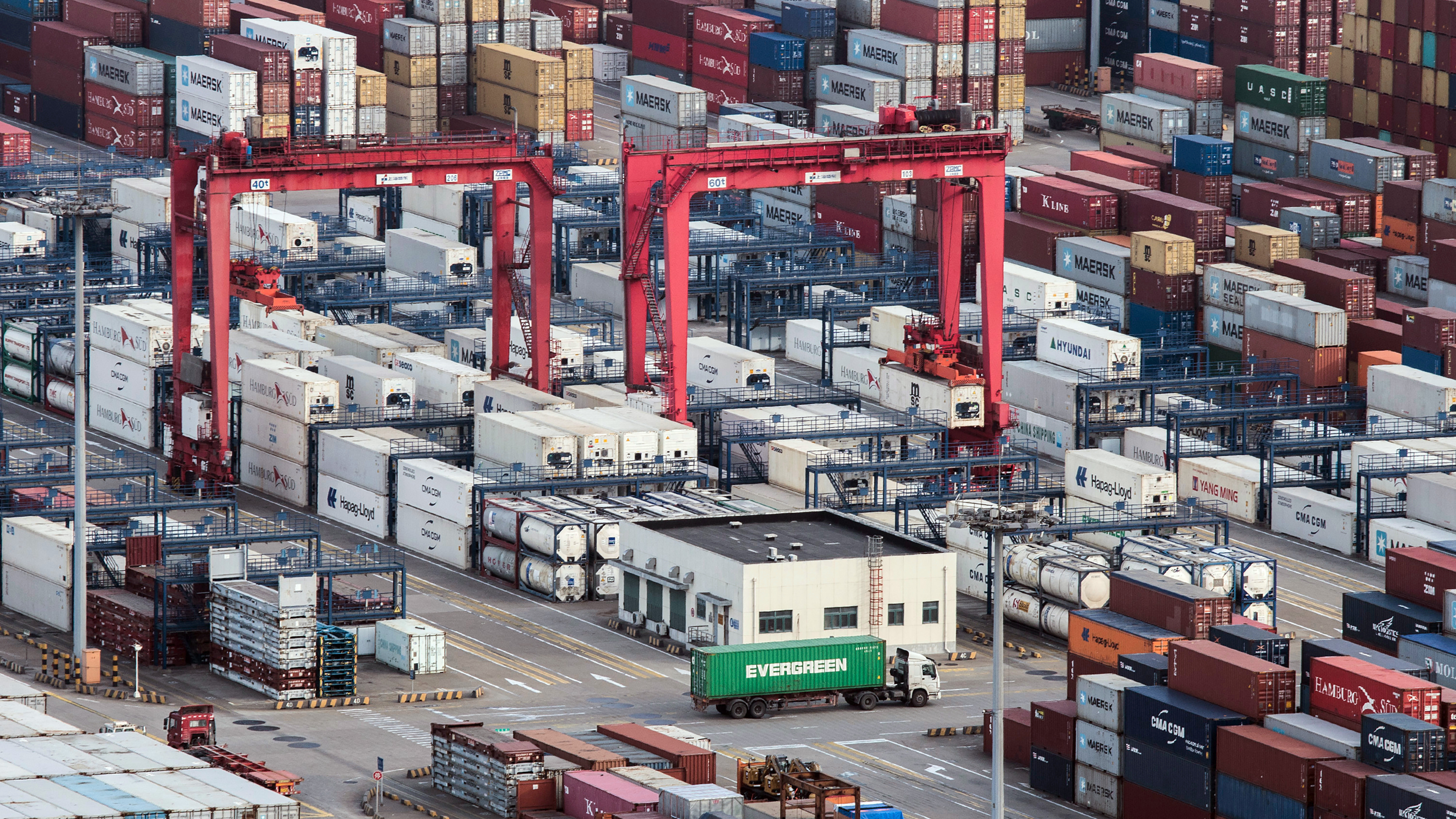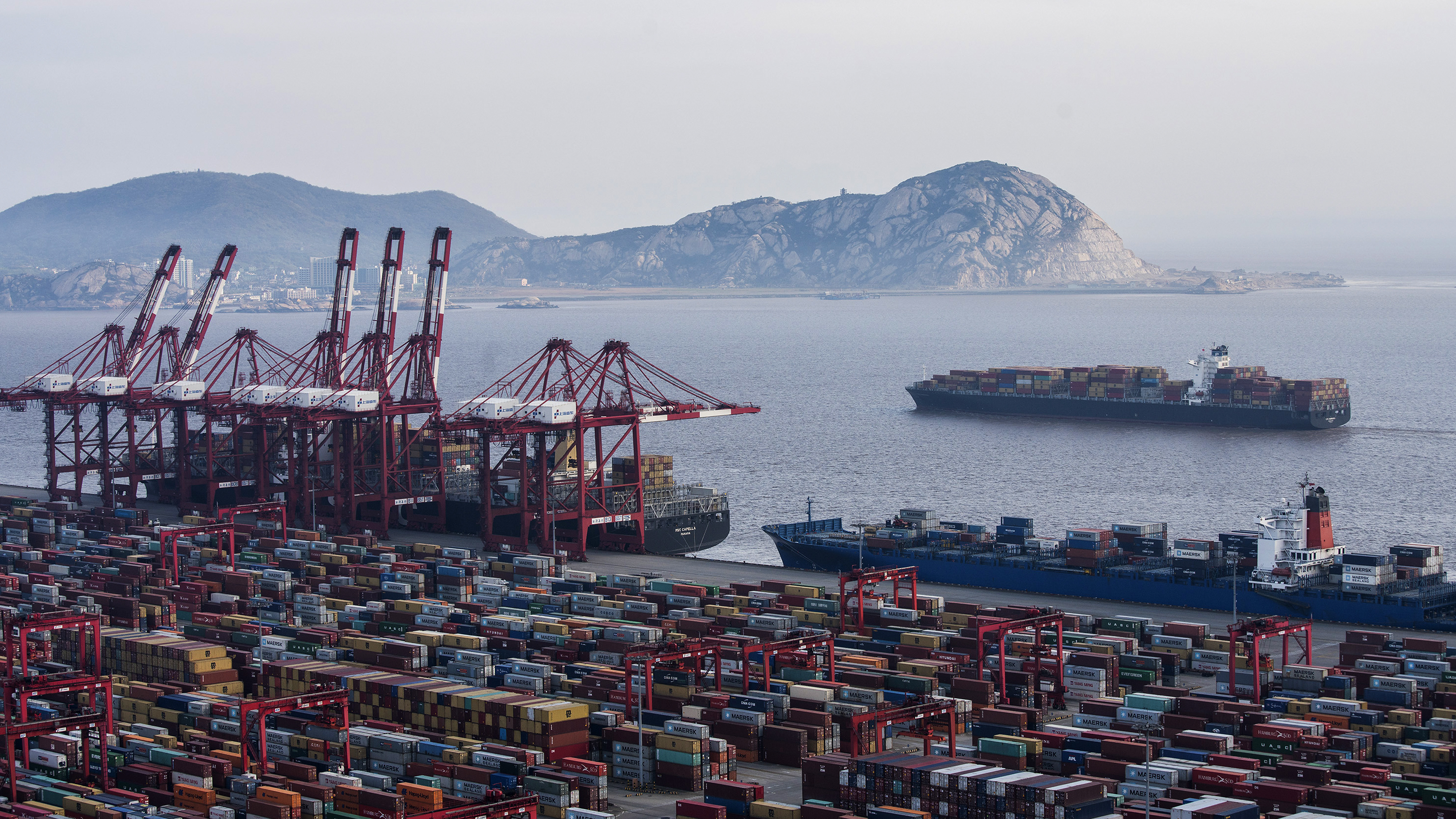
Yangshan Port in Shanghai. /AP
Yangshan Port in Shanghai. /AP
The new coronavirus outbreak is having a major impact on the shipping industry and port operations in China. The country houses seven of the world's busiest ports and dozens of sailing schedules have been canceled since late January. But the transport and logistics sector might be starting to pick up again.
Danish shipping company Maersk Line said on Tuesday, "The majority of provinces are now gradually resuming work," and terminal operations continue with loading and discharging of vessels. However "Ningbo, Shanghai, and Tianjin terminals report full reefer (refrigerated) yard density."
The resumption comes after port operations came to a halt amid a fall in the number of electrical outlets for refrigerated containers.
A previous notice by Maersk on February 7 said Xingang and Shanghai ports are facing a shortage of reefer plugs and the company recommended merchants to ship to "other Chinese ports or destinations," especially in case of fruits, vegetables, and frozen meat.
Mediterranean Shipping Company (MSC) on February 12 stated that Chinese ports were congested, resulting in a lack of available plugs for refrigerated containers. Without power sources, the company can't offload the consignments, so they need to be redirected to an intermediate or alternative port, or the carrier may need to abandon them and communicate with the merchant where the containers can be collected. This means extra charges for importers.
The companies would not tell CGTN Digital what types of goods are inside the containers and their quantities, raising questions about the impact on imported food supply chain. Reefers can carry frozen fish and meat at extremely low temperatures; fruits, tomatoes and potatoes with a cold treatment or multiple temperatures; and medicine.
Maersk added that Ningbo and Shanghai are not only at full capacity in terms of refrigerated containers but also at "high to full" capacity in terms of empty containers – probably as a result of the industrial slowdown in the last few weeks and cancellations.
"The Nanjing terminal dangerous goods yard is full due to slow pick-up. Operations for both dangerous goods laden import and export units are affected. Hence, new dangerous goods bookings to and from Nanjing will be subject to a case by case acceptance," said Maersk, the largest shipping group in the world.

China Shipping Company./ AP Photo
China Shipping Company./ AP Photo
Trucking services lagging due to lack of workers
Maersk's report notes that ocean terminal depots are open, off-dock depots have resumed work, and the company's warehouses are also back in business except for the one in Chongqing.
Previously affected barge operations are now coming back to normal after being cleaned up. The same goes for trucking suppliers that are operating but face a lack of labor supply with "less than 50 percent" of workers on duty.
"Trucking capacity remains a key challenge, due to local policy and restrictions," said Maersk, adding that it is introducing a multi-modal bundle service in the Yangtze River, especially in the Suzhou, Wuxi and Changzhou areas, where they connect the first-mile trucking with barge or rail services to the Shanghai terminal.
In terms of air freights, Maersk notes that freighters are resuming service, but cancellations might happen if volumes are not sufficient to support a flight, so merchants should prepare for delays.
"We foresee volume will be ramping up over the coming weeks – around the end of February to early March. Meanwhile, there is also a strong indication that there will be a conversion of ocean freight shipments to air for urgent cargo, which could sharply increase market demand," the shipping giant notes.
Rail might be the 'fast option'
As for rail, Maersk indicates that "intercontinental rail market volume and capacity are recovering," and customers are considering using this service as a "fast option to mitigate the cargo delay."
On January 17, the company said rail connections between China and Europe were slowly picking up. Some gateways resumed departure on westbound connections but with less frequency than usual.
Data available on the Maersk website shows that at least 41 sea connections have been canceled since the end of January, including shipments scheduled for early March, for example with Australian exports coming to Xiamen.
The world's biggest shipping companies, Maersk, MSC, Cosco, CMA-CGM, and Evergreen, have all resumed office operations, although in some cases partially, with some employees working from home.

Yangshan port in Shanghai./ AP Photo
Yangshan port in Shanghai./ AP Photo
Dealing with the virus threat
To mitigate the coronavirus impact on the sector, 16 Chinese ports and port groups have started offering exemptions and reductions in port charges since early February, according to Seatrade Maritime News.
The Chinese government put in place restrictions on some ports to contain the spread of the disease. For example, all ports have banned crew disembarking, and vessels berthing in Tianjin, Dalian, and Xiamen ports must provide a health declaration before docking, ship-technology.com said.
Crews from Wuhan or Hubei Province are not allowed to berth at the Putian and Quanzhou ports, and at Ningbo port, these ships must undergo a 14-day isolation period before berthing. Substitution of crew at Shanghai, Xiamen, Ningbo, Tianjin, Dalian, Qingdao and Guangzhou ports is not allowed.
China is home to seven of the world's 10 busiest seaports. The Port of Shanghai processes more cargo than any other in the world, and recorded 43.3 million TEU (twenty-foot equivalent unit is the inexact unit of a container) in container volume and 36 billion renminbis in revenue last year.